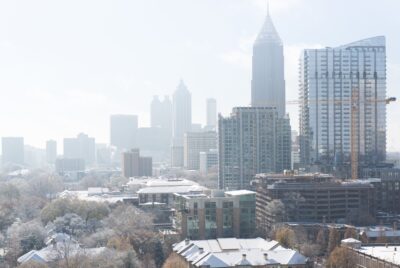
Unusual weather patterns are becoming the usual as climate change makes once predictable weather systems unpredictable. Along with being unusual, think freezing temperatures in Atlanta, the conditions brought by these phenomena are also severe, think ice storms in Atlanta. These new weather emergencies have not replaced those Atlantans expect – they have just added to the list of possibilities.
A return to the weather’s version of “business as usual” is highly unlikely, so all major cities, including the City of Atlanta, need to be prepared to keep their residents safe from these weather emergencies and consequences. As it stands now, some cities are in better shape than others.
Typical Winter Weather in Atlanta
Though Atlanta is hot and humid for much of the year, the winter months have typically brought more variable and colder spells. Low temperatures average in the mid-to-lower 30s and may occur from 50 to 70 days per year. Snowfall is not typical and is usually expected only a few days per year.
With so little snow and ice anticipated, it makes sense that Atlanta does not devote a lot of its budget and workers to snow and ice removal. Compared to Minnesota, which expects 50 inches of snow per year and has 70 snow plows at the ready, Atlanta has six vehicles to manage its two-inch expectation. There are 24 additional plows available for contract, should the need arise.
Since temperatures tend to rise within a few days of snowfall, the city often does not even send trucks to clear smaller neighborhood streets before the snow melts.
Get the strong arm
Atlanta’s Unexpected Winter Weather Tests
In 2014, a snowstorm dropped 2.6 inches of snow in the Atlanta area. Though the accumulation was not far above Atlanta’s expectation, it paralyzed travelers for hours, causing about 1200 car accidents and showcasing the government’s lack of preparedness as the governor waited five hours to declare a state of emergency. Roads were gridlocked, preventing any snow-clearing, and students and teachers were stranded in school buildings.
It took an average of six hours for drivers to cover 10 miles. Longer for those heading downtown. It was 18 hours before travel conditions returned to normal. The price tag for the City of Atlanta was about $2.8 million, and collectively worse for Atlanta residents who suffered property damage, mostly to their cars, or burst pipes.
A second storm followed a few weeks later, coating the Atlanta region in ice and causing dangerous road conditions and power outages. This time, Atlanta’s government was quicker to issue warnings to keep people off the roads. The cost for clean-up came in at over $10 million, bringing the total cost for both storms to about $13.5 million.
Atlanta’s Current State of Preparation for Winter Weather Emergencies
In some ways, Atlanta learned from its 2014 experiences. The City strengthened its protocols for announcing weather emergencies and methods for educating drivers on how to stay safe in icy or snowy conditions–mainly by staying off the roads.
For emergency weather alerts, Atlantans can register for Atlanta’s Federal Emergency Board (FEB) emergency notification system and access the Atlanta Center Weather Service Unit through the National Weather Service. Fulton county also has its own Fulton Alerts Community Notifications (FALCON) for residents who sign up, and the City of Atlanta offers information for building emergency preparedness.
The City has not allocated more funding toward winter-weather cleanup, according to recent statements by then-interim commissioner of the Atlanta Department of Transportation (DOT), Marsha Anderson, who stated residents would rather the government prioritize funding for issues regularly affecting the area rather than for rare weather situations.
How Atlanta Compares with Other Major Cities
Despite the lessons learned, it seems Atlanta has a long way to go when it comes to preparing for weather emergencies. A recent study published in the International Journal of Disaster Risk Reduction shows areas of serious concern for Atlanta’s most vulnerable residents.
Urban planning scholars John Renne and Estefania Mayorga evaluated how city governments have upgraded or instituted emergency procedures for their areas since Hurricane Katrina devastated New Orleans in 2005. The researchers focused on evacuation plans for the 25% of residents most likely to be left behind in the face of an oncoming hurricane, ice storm, or another emergency. This 25% includes:
- The poor
- The elderly
- Those without cars
- Unaccompanied minors
- The homeless
- Tourists
- Those with certain disabilities, such as blindness
How Atlanta Falls Short
Researchers assessed the emergency plans (if they existed), released after 2010 and before the onset of the COVID pandemic, of the 50 largest cities in America. In the review, they evaluated whether or to what extent government officials:
- Maintained records of people with disabilities or specific needs
- Had vehicles equipped to service people with disabilities
- Had arranged pickup areas for people with disabilities
- Established multi-modal evacuation plans
- Had plans for evacuating very large numbers of pedestrians
The cities with the highest ratings for having strong emergency plans in place include
- Charlotte, NC
- Cleveland, OH
- Jacksonville, FL
- Miami, FL,
- New Orleans, LA
- New York, NY
- Philadelphia, PA
Cities with the lowest ratings include:
- Detroit, MI
- Las Vegas, NE
- Minneapolis, MN
- Atlanta, GA
- Chicago, IL
- Los Angeles, CA
These cities rank low for having no evacuation strategy or having “secret plans,” which ultimately provide no help to residents not “in the know.” Atlanta had no available plan.
Atlanta’s Less Predictable Winter Weather
Renne asserts that weather disasters and emergencies can now “happen anywhere, anyplace, anytime, because of the unpredictable patterns in our weather.” Atlantas are witnessing those changes in real-time, even being put under a freezing weather state of emergency this winter.
City officials owe all of their residents, and especially those most vulnerable, an organized, well-communicated plan for navigating these emergencies or evacuating to a safer location.
If the City of Atlanta Has Failed You, Can Count on Us for Help
As a resident of Atlanta, you deserve to know your city government is doing everything in its power to keep you safe during the unpredictable winter season or any other emergency weather conditions. Students should never be stranded in schools, drivers should never be stranded on icy, gridlocked roads, and no resident should be left without help. If you have been harmed by the city’s failure to plan, call John Foy & Associates for help from an experienced attorney.
(404) 400-4000 or complete a Free Case Evaluation form

